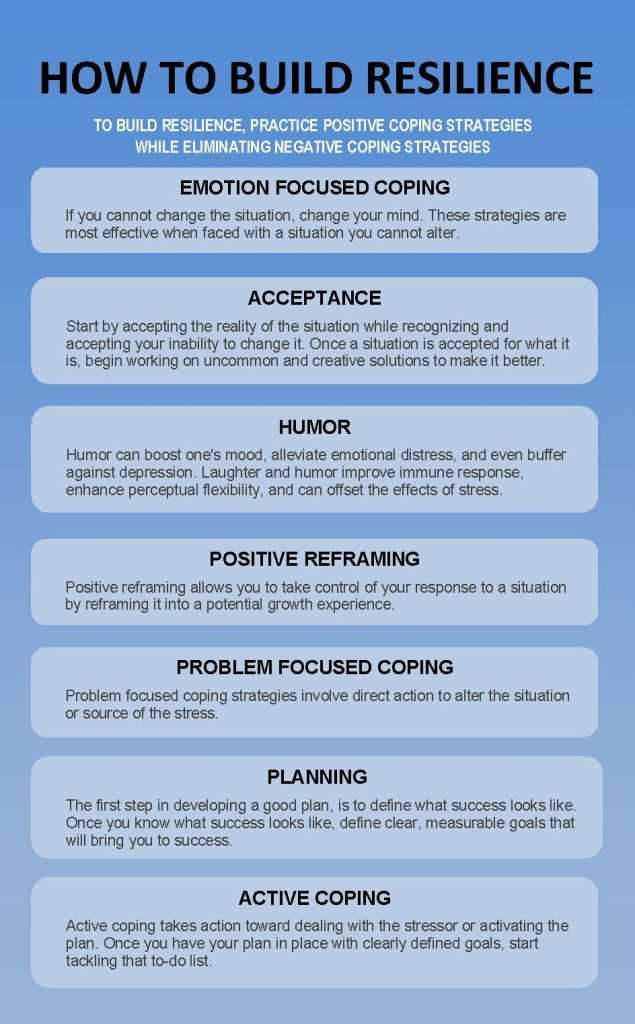
Life is full of challenges and stressful events that test our strength and adaptability. Whether it’s a personal crisis, a global pandemic, or any other difficult situation, our ability to bounce back and recover is crucial. This is where resilience comes into play – the mental and emotional endurance to face adversity and come out stronger.
Resilience is not something we are born with, but rather a skill that can be developed and strengthened over time. It involves learning how to cope with stress, managing our emotions, and finding healthy ways to recover from difficult events. By building resilience, we can navigate through life’s ups and downs with greater ease and grace.
So, how can we cultivate resilience in the face of stressful events? One strategy is to develop a strong support system. Surrounding ourselves with friends, family, and mentors who can provide emotional support and guidance can make a world of difference. Additionally, practicing self-care and self-compassion is crucial. Taking the time to nurture our physical, emotional, and mental well-being can help us stay grounded and resilient in the face of stress.
Understanding Resilience
Resilience is the ability to bounce back and recover from stressful events or mental challenges. It is the strength and adaptability to cope with difficult situations, and to come out stronger on the other side. Resilience is not about avoiding or ignoring stress, but rather about finding healthy ways to manage and overcome it.
When faced with stressful events, resilient individuals are able to maintain a positive mindset and perspective. They are able to adapt to change and find solutions to problems. Resilience involves developing effective coping mechanisms and strategies to help navigate through challenging times.
One key aspect of resilience is the ability to recover from setbacks or failures. Resilient individuals understand that setbacks are a part of life and view them as learning opportunities. They are able to bounce back and continue moving forward, even when faced with adversity.
Building resilience requires self-reflection and self-awareness. It involves recognizing and understanding one’s own strengths and weaknesses. By identifying areas for growth, individuals can work on developing the skills and qualities needed to become more resilient.
Resilience is not something that is innate, but rather a skill that can be cultivated and strengthened over time. It requires practice and perseverance. By actively working on building resilience, individuals can better navigate through stressful events and come out stronger on the other side.
What is Resilience?
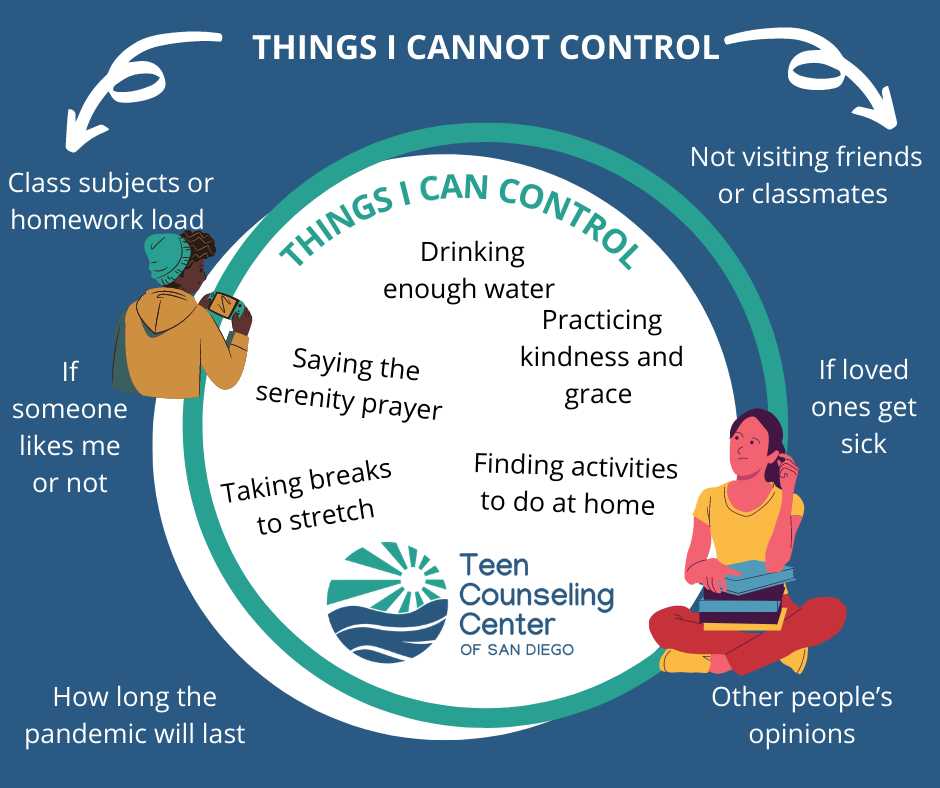
Resilience refers to the ability to cope with and recover from stressful events. It is a mental strength that allows individuals to endure difficult situations and adapt to changes in their environment.
Resilience is not about avoiding or ignoring stress; instead, it is about developing the skills and mindset to navigate through challenging times. It involves building emotional and psychological endurance, as well as the ability to bounce back and recover from setbacks.
Resilience is a valuable trait that can be developed and strengthened over time. It involves cultivating self-awareness, building a support network, and developing effective coping strategies.
When faced with stressful events, resilient individuals are able to maintain a positive outlook, regulate their emotions, and find ways to problem-solve and adapt. They are able to bounce back from adversity and continue moving forward.
Resilience is not a fixed trait; it can be cultivated and improved upon. With practice and the right mindset, individuals can develop their resilience and become better equipped to handle stressful events and recover from them.
Overall, resilience is a valuable quality that enables individuals to navigate through life’s challenges with strength and adaptability. It is an essential skill for building mental and emotional well-being and promoting recovery in the face of stressful events.
The Importance of Resilience
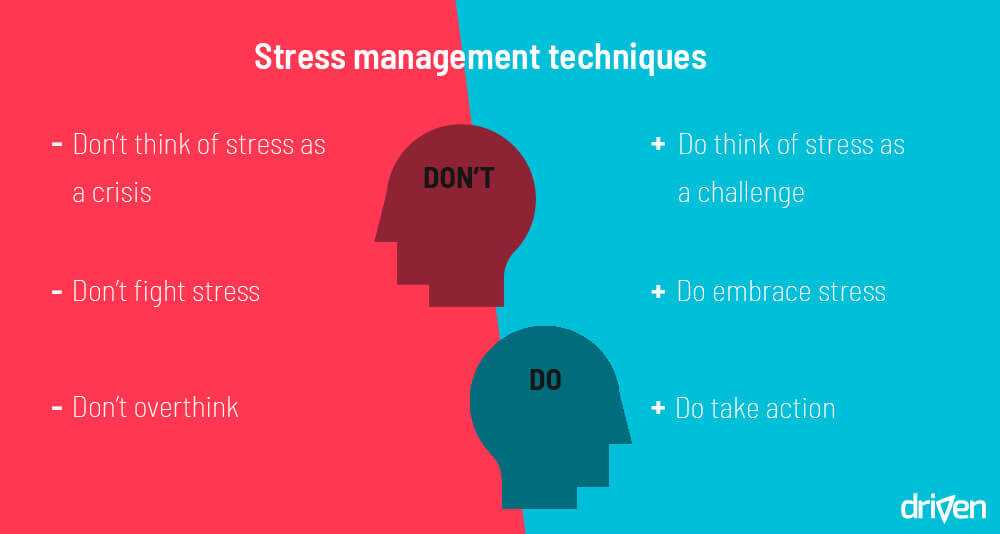
Resilience is the ability to endure and recover from stressful events, both mentally and emotionally. It is a strength that allows individuals to adapt and bounce back when faced with challenging circumstances. Building resilience is essential in today’s fast-paced and unpredictable world, as it helps individuals navigate through difficult times and maintain their well-being.
Stressful events are a part of life, and having resilience can make a significant difference in how we respond to them. Resilient individuals are better equipped to handle adversity, as they possess the mental and emotional tools to cope effectively. They are more likely to view setbacks as temporary and solvable, rather than insurmountable obstacles.
Resilience also plays a crucial role in maintaining good mental health. When faced with stressful events, individuals with resilience are better able to manage their emotions and maintain a positive outlook. They are more likely to seek support from others and engage in self-care activities that promote well-being.
Furthermore, resilience fosters adaptability, which is essential in today’s rapidly changing world. Individuals who are resilient can quickly adjust to new circumstances and find creative solutions to problems. They are not easily discouraged by setbacks and setbacks, but rather see them as opportunities for growth and learning.
In conclusion, resilience is of utmost importance in building endurance and strength in the face of stressful events. It allows individuals to recover and adapt, maintaining their mental well-being and effectively navigating through challenging circumstances. Developing resilience is a lifelong journey that involves cultivating positive coping strategies, seeking support, and maintaining a positive mindset.
Factors Influencing Resilience
Resilience is the ability to bounce back and recover from stressful events. It is influenced by various factors that can either strengthen or weaken an individual’s coping mechanisms and endurance. These factors include:
- Adaptability: The ability to adapt and adjust to new situations and challenges is crucial for building resilience. Being flexible and open to change can help individuals navigate through stressful events more effectively.
- Mental Strength: A strong mindset and positive outlook can significantly impact an individual’s resilience. Developing mental strength involves cultivating self-belief, optimism, and the ability to reframe negative thoughts into more positive and constructive ones.
- Social Support: Having a strong support system of family, friends, and community can provide emotional and practical support during stressful events. Social support can help individuals feel less alone and provide a sense of belonging, which can contribute to their resilience.
- Self-Care: Taking care of one’s physical and mental well-being is essential for building resilience. Engaging in activities that promote relaxation, stress reduction, and self-reflection can help individuals recover and recharge during and after stressful events.
- Problem-Solving Skills: Having effective problem-solving skills can enhance an individual’s ability to overcome challenges and find solutions. Being able to analyze situations, identify potential solutions, and take action can contribute to resilience in stressful events.
These factors play a significant role in an individual’s ability to cope with and recover from stressful events. By focusing on strengthening these factors, individuals can enhance their resilience and navigate through challenging times with greater ease.
Developing Resilience
Resilience is the ability to endure and bounce back from stressful events. It is a mental strength that allows us to cope with adversity and adapt to challenging situations. Developing resilience is essential for our overall well-being and recovery.
Here are some strategies to help you build resilience:
1. Cultivate a positive mindset: Focus on the positives in your life and practice gratitude. This can help shift your perspective and build mental resilience.
2. Build a support network: Surround yourself with people who uplift and support you. Having a strong support network can provide emotional support during challenging times.
3. Practice self-care: Take care of your physical and mental health. Engage in activities that bring you joy and help you relax. This can help reduce stress and improve your ability to handle difficult situations.
4. Develop problem-solving skills: Enhance your problem-solving skills to effectively navigate stressful events. Break down problems into smaller, manageable steps and brainstorm potential solutions.
5. Embrace change and adaptability: Life is full of unexpected events. Developing resilience means being open to change and adapting to new circumstances. This flexibility can help you navigate through difficult times.
6. Practice mindfulness: Mindfulness is the practice of being present in the moment and non-judgmentally observing your thoughts and feelings. This can help reduce stress and enhance your ability to cope with stressful events.
Remember, developing resilience takes time and effort. By incorporating these strategies into your daily life, you can build the mental strength needed to bounce back from stressful events and maintain your well-being.
Identifying and Accepting Emotions
Resilience is not just about mental strength and the ability to bounce back from difficult situations; it also involves the capacity to recognize and accept our emotions. In times of stress and adversity, it is crucial to identify and acknowledge our feelings, as this is the first step towards building resilience and promoting mental well-being.
Identifying emotions can be challenging, especially when we are overwhelmed by the demands of stressful events. However, taking the time to reflect on our emotional experiences can provide valuable insights into our mental state and help us develop strategies for recovery.
When faced with stressful events, it is common to experience a wide range of emotions, such as fear, anger, sadness, or frustration. These emotions are natural reactions to challenging circumstances and should be acknowledged rather than suppressed. By allowing ourselves to feel and express these emotions, we can begin the process of healing and adaptation.
Accepting emotions does not mean dwelling on negative feelings or wallowing in self-pity. Instead, it involves recognizing and validating our emotions without judgment. This acceptance allows us to move forward and find constructive ways to cope with the challenges we face.
Building resilience requires endurance and adaptability, and accepting our emotions is an essential part of this process. By acknowledging and accepting our feelings, we can develop a greater understanding of ourselves and cultivate the mental strength needed to navigate through stressful events.
Building a Support Network
Building a strong support network is crucial in developing resilience and coping with stressful events. A support network consists of individuals who provide emotional, mental, and sometimes even physical support during challenging times. These individuals can be friends, family members, colleagues, or professionals such as therapists or counselors.
Having a support network can greatly enhance one’s endurance and strength in the face of adversity. When going through stressful events, having someone to talk to, share concerns with, and seek advice from can make a significant difference in one’s ability to bounce back and recover.
A support network provides a safe space for individuals to express their feelings and emotions, reducing the mental burden and promoting resilience. It also offers an opportunity for individuals to learn from others’ experiences and gain valuable insights that can aid in their own recovery and adaptability.
Building a support network involves reaching out to individuals who are trustworthy, empathetic, and understanding. It is important to surround oneself with people who genuinely care and are willing to provide support when needed. Regular communication and nurturing these relationships can help create a strong foundation for resilience.
| Tips for Building a Support Network |
| 1. Identify individuals in your life who you feel comfortable opening up to and seeking support from. |
| 2. Reach out to these individuals and let them know that you value their support. |
| 3. Regularly communicate with your support network, whether through phone calls, text messages, or in-person meetings. |
| 4. Be open and honest about your feelings and concerns, as this will allow others to better understand and support you. |
| 5. Consider joining support groups or seeking professional help if you feel the need for additional support. |
| 6. Reciprocate support by being there for others in their times of need. |
By building a strong support network, individuals can enhance their resilience and better navigate through stressful events. Remember, resilience is not about facing challenges alone, but rather utilizing the strength and support of others to overcome adversity.
Setting Realistic Goals
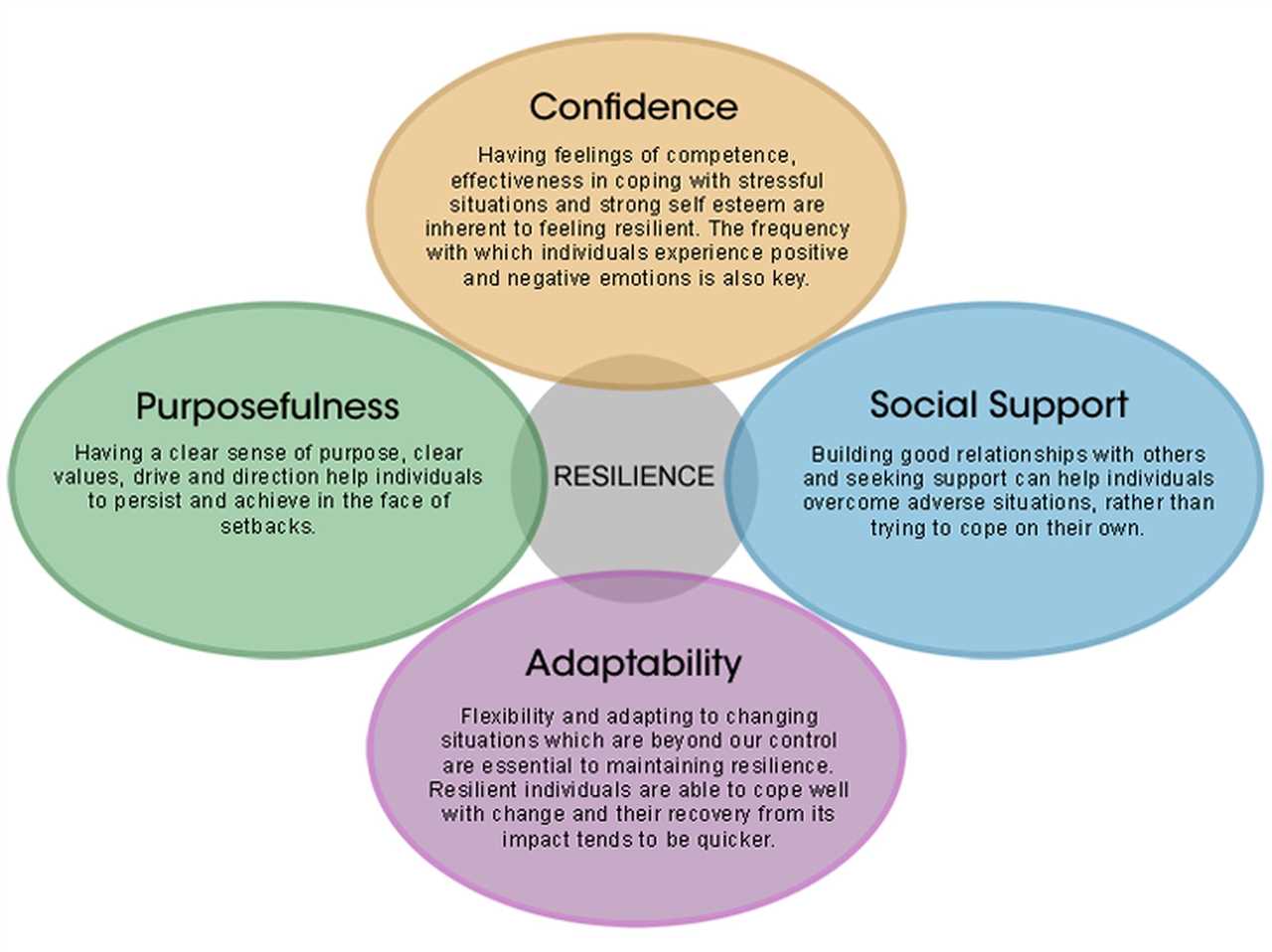
When facing stressful events, setting realistic goals can be a powerful coping strategy. It is important to recognize that resilience is not about avoiding or eliminating stress, but rather about developing the mental strength and adaptability to endure and bounce back from challenging situations.
Setting realistic goals helps to build resilience by providing a sense of direction and purpose. When setting goals, it is crucial to consider your current circumstances and limitations. Unrealistic goals can lead to frustration and disappointment, which can further exacerbate stress levels.
Here are some tips for setting realistic goals to enhance your resilience:
- Assess your current situation: Take stock of your strengths, weaknesses, and available resources. Consider your mental and physical endurance, as well as any external factors that may affect your ability to achieve goals.
- Break goals into smaller steps: Instead of overwhelming yourself with one big goal, break it down into smaller, more manageable steps. This allows you to celebrate small victories along the way and maintain motivation.
- Set specific and measurable goals: Clearly define what you want to achieve and establish criteria to track your progress. This helps to keep you focused and provides a sense of accomplishment as you reach each milestone.
- Be flexible and adaptable: Recognize that circumstances may change and be willing to adjust your goals accordingly. Adaptability is a key component of resilience, and being able to modify your goals can help you navigate unexpected challenges.
- Seek support: Share your goals with trusted friends, family members, or a therapist. They can provide encouragement, accountability, and guidance as you work towards your goals.
Remember, setting realistic goals is not about limiting yourself but rather ensuring that you are setting yourself up for success. By setting achievable goals, you can build your resilience and develop the strength and endurance needed to navigate stressful events.
Practicing Resilience
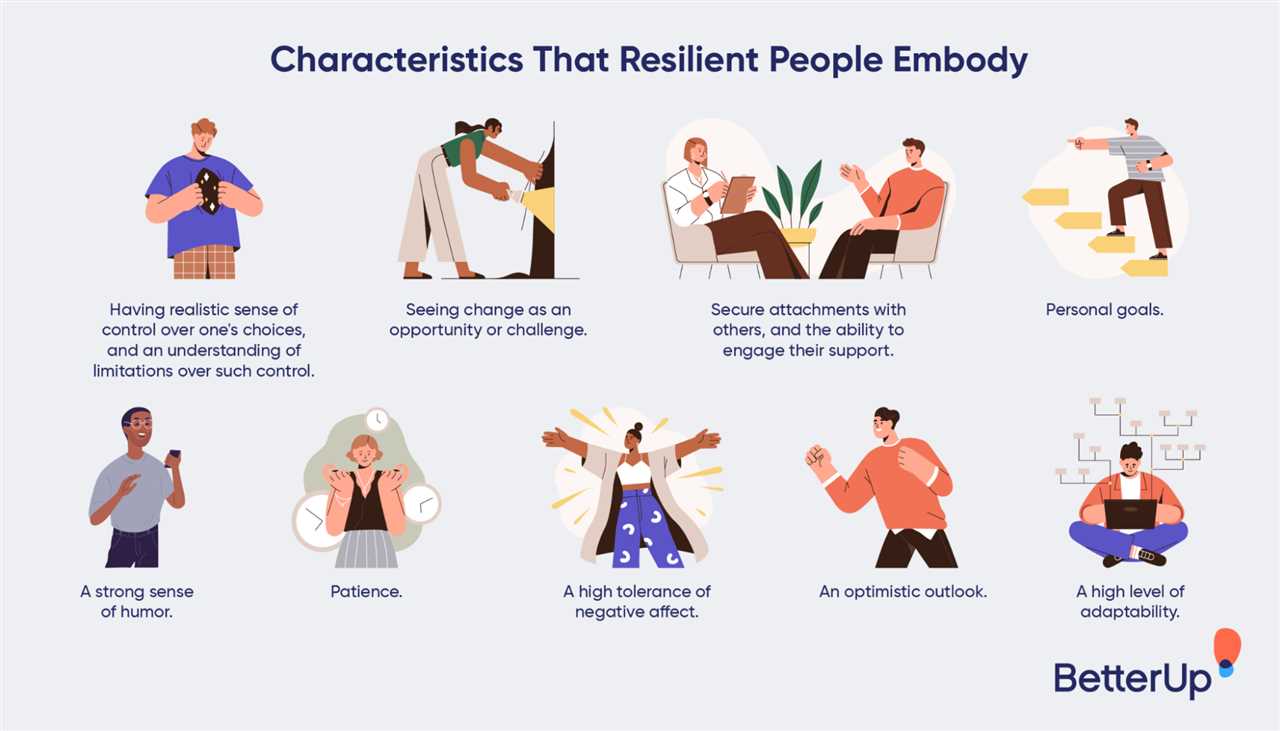
Building resilience is crucial when facing stressful events. It is the ability to adapt and cope with challenges, allowing individuals to bounce back and recover from difficult situations. Practicing resilience requires strength, endurance, and a positive mindset.
One way to practice resilience is by developing a support network. Surrounding yourself with people who can provide emotional support, guidance, and encouragement can help you navigate through tough times. This network can include family, friends, mentors, or support groups.
Another important aspect of practicing resilience is self-care. Taking care of your physical and mental well-being is essential in building resilience. This can include engaging in activities that bring you joy, practicing relaxation techniques such as meditation or deep breathing exercises, and maintaining a healthy lifestyle through regular exercise and a balanced diet.
Additionally, developing problem-solving skills can contribute to resilience. By learning how to identify and address challenges, you can build the confidence and ability to overcome obstacles. This can involve breaking down problems into smaller, manageable tasks, seeking advice or guidance, and finding creative solutions.
Building resilience also requires a positive mindset. Focusing on the positives and practicing gratitude can help shift your perspective and build resilience in the face of adversity. This can involve keeping a gratitude journal, reflecting on achievements and strengths, and finding meaning and purpose in challenging situations.
Lastly, it is important to remember that building resilience is a process. It takes time and practice to develop the skills and mindset needed to navigate through stressful events. By embracing challenges, seeking support, and practicing self-care, you can strengthen your resilience and better cope with the ups and downs of life.
| Key Points: |
|---|
| – Building resilience is crucial in stressful events. |
| – Develop a support network for emotional support. |
| – Take care of your physical and mental well-being. |
| – Develop problem-solving skills to overcome challenges. |
| – Maintain a positive mindset and practice gratitude. |
| – Building resilience is a process that takes time and practice. |

I am Patrina de Silva, a psychologist and mental health blogger in Sri Lanka. After obtaining psychology degrees from the University of Colombo and Monash University, I returned home to work as a counselor while also starting the popular blog “Pressy but Happy” to provide advice on psychological issues. Over the past decade, my empathetic articles have made my blog a leading mental health resource in the country. In addition to writing, I maintain a private therapy practice, frequently volunteer counseling time, and conduct seminars, driven by my passion for destigmatizing mental illness and educating the public on the mind-body connection. I strive to be an influential voice in my field through my compassionate approach.
